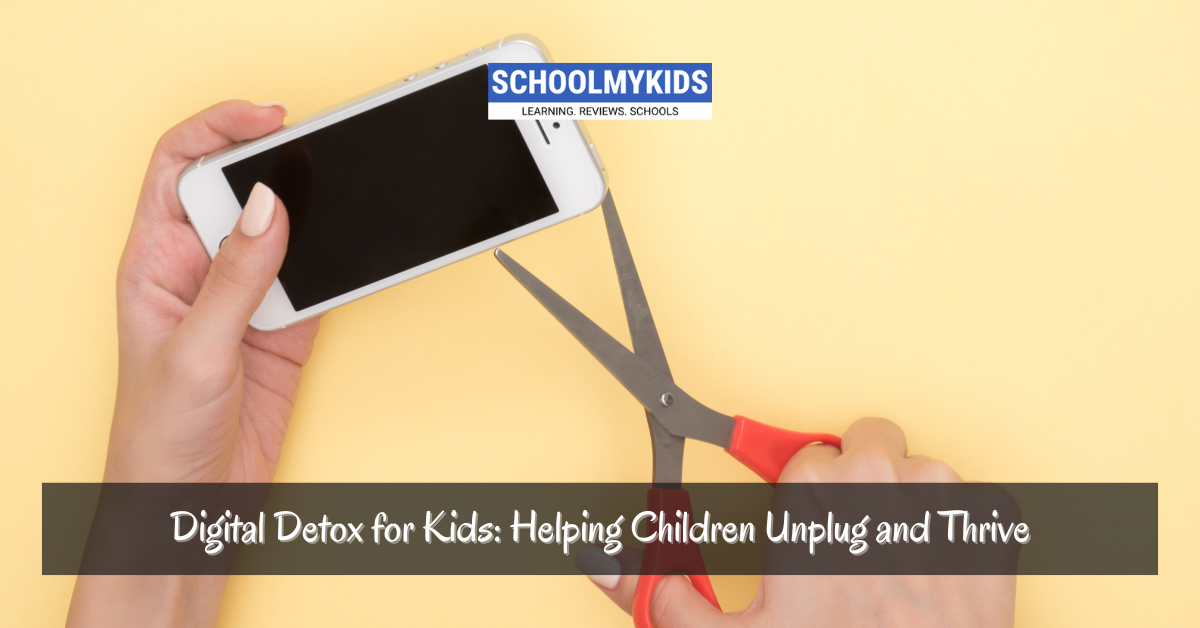In the digital age, screens have become an integral part of children's lives. From educational apps to online games and social media, kids are spending more time than ever in front of screens. While technology has its benefits, excessive screen time can lead to various physical, mental, and social issues. This is where the concept of a "digital detox" comes in. A digital detox involves taking a break from screens to focus on real-world activities. This article explores the importance of digital detox for kids, backed by research and practical tips for parents.
Understanding the Need for a Digital Detox
The Impact of Excessive Screen Time
Excessive screen time can have several negative effects on children, including:
- Sleep Problems: The blue light from screens can interfere with the production of melatonin, a hormone that regulates sleep, leading to difficulties in falling asleep and staying asleep.
- Reduced Physical Activity: More time on screens means less time for physical activities, which are essential for healthy growth and development.
- Poor Social Skills: Spending too much time online can reduce opportunities for face-to-face interactions, impacting social skills and relationships.
- Eye Strain: Prolonged screen use can cause eye strain, headaches, and blurred vision.
- Attention and Learning Issues: Fast-paced and stimulating content can make it harder for children to focus on tasks that require sustained attention, such as reading or doing homework.
The Benefits of a Digital Detox
A digital detox can help mitigate these negative effects and offer several benefits:
- Improved Sleep: Reducing screen time, especially before bed, can help children fall asleep more easily and enjoy better quality sleep.
- Enhanced Physical Health: More time spent on physical activities can improve fitness, coordination, and overall health.
- Better Social Skills: Engaging in face-to-face interactions can strengthen social skills and build stronger relationships.
- Reduced Eye Strain: Taking breaks from screens can alleviate eye discomfort and reduce the risk of long-term vision problems.
- Increased Attention and Focus: Spending less time on fast-paced digital content can help improve attention span and academic performance.
Practical Tips for a Successful Digital Detox
Set Clear and Realistic Goals
- Create a Plan: Work with your child to set clear goals for the digital detox. Decide on the duration of the detox and what activities will replace screen time.
- Start Small: Begin with manageable steps, such as reducing screen time by 30 minutes a day, and gradually increase the duration of the detox.
Encourage Alternative Activities
- Outdoor Play: Encourage your child to play outside, whether it's riding a bike, playing sports, or exploring nature. Physical activities are not only fun but also crucial for healthy development.
- Creative Hobbies: Introduce your child to creative hobbies such as drawing, painting, crafting, or playing a musical instrument. These activities can stimulate the brain and foster creativity.
- Reading: Promote a love for reading by providing a variety of books that match your child's interests. Reading can improve language skills, concentration, and imagination.
- Family Time: Spend quality time together as a family by playing board games, cooking, or doing puzzles. These activities can strengthen family bonds and create lasting memories.
Establish Screen-Free Zones and Times
- Designate Screen-Free Areas: Create specific areas in your home where screens are not allowed, such as the dining room and bedrooms. This encourages family interaction and better sleep habits.
- Set Screen-Free Times: Establish certain times of the day when screens are off-limits, such as during meals, one hour before bedtime, and during family activities.
Be a Role Model
- Lead by Example: Show your child that you also value time away from screens by limiting your own screen use and engaging in non-digital activities.
- Join in Activities: Participate in screen-free activities with your child to make the experience enjoyable and to show that it's a family effort.
Monitor and Adjust
- Track Progress: Keep track of your child's screen time and the activities they engage in during the digital detox. Celebrate successes and discuss any challenges.
- Adjust as Needed: Be flexible and adjust the plan as needed based on what works best for your child and family. The goal is to find a healthy balance that can be maintained long-term.
The Role of Parents and Educators
Support and Guidance
Parents and educators play a crucial role in supporting a digital detox. Here are some additional tips:
- Educate: Teach children about the benefits of a digital detox and the potential negative effects of excessive screen time. Knowledge can empower them to make healthier choices.
- Encourage Balance: Promote a balanced approach to screen time, emphasizing the importance of both digital and real-world experiences.
- Create a Supportive Environment: Foster an environment that supports a digital detox by providing access to alternative activities and minimizing unnecessary screen exposure.
Seeking Professional Help
If you find it challenging to manage your child's screen time or notice significant issues related to screen use, consider seeking help from professionals such as pediatricians, child psychologists, or counselors. They can provide guidance and support tailored to your child's needs.
Conclusion
A digital detox can be a valuable tool for promoting healthy brain development, physical health, and social skills in children. By understanding the impact of excessive screen time and implementing practical strategies for reducing screen use, parents and educators can help children achieve a balanced and healthy lifestyle. Remember, the goal is not to eliminate screens entirely but to create a balanced environment that includes a variety of enriching activities and experiences.
References
- American Academy of Pediatrics. (2021). Media and Children Communication Toolkit.
- World Health Organization. (2019). Guidelines on Physical Activity, Sedentary Behaviour, and Sleep for Children under 5 Years of Age.
- Common Sense Media. (2020). The Common Sense Census: Media Use by Kids Age Zero to Eight.
By staying informed and proactive, we can protect our children from the potential negative effects of excessive screen time and promote a healthy, balanced approach to digital media.









Be the first one to comment on this story.